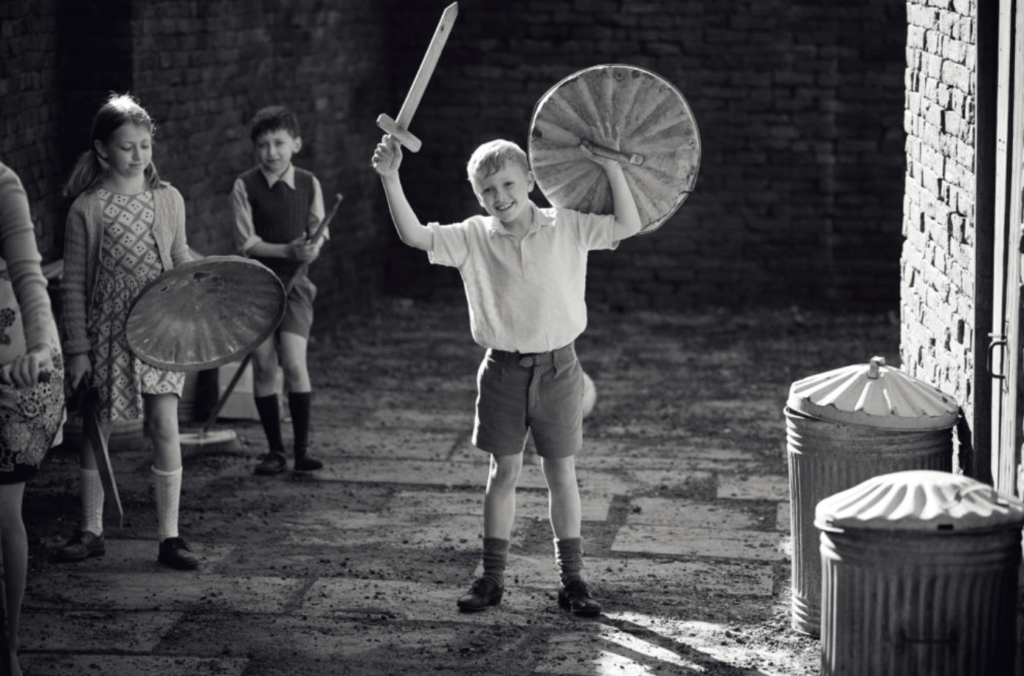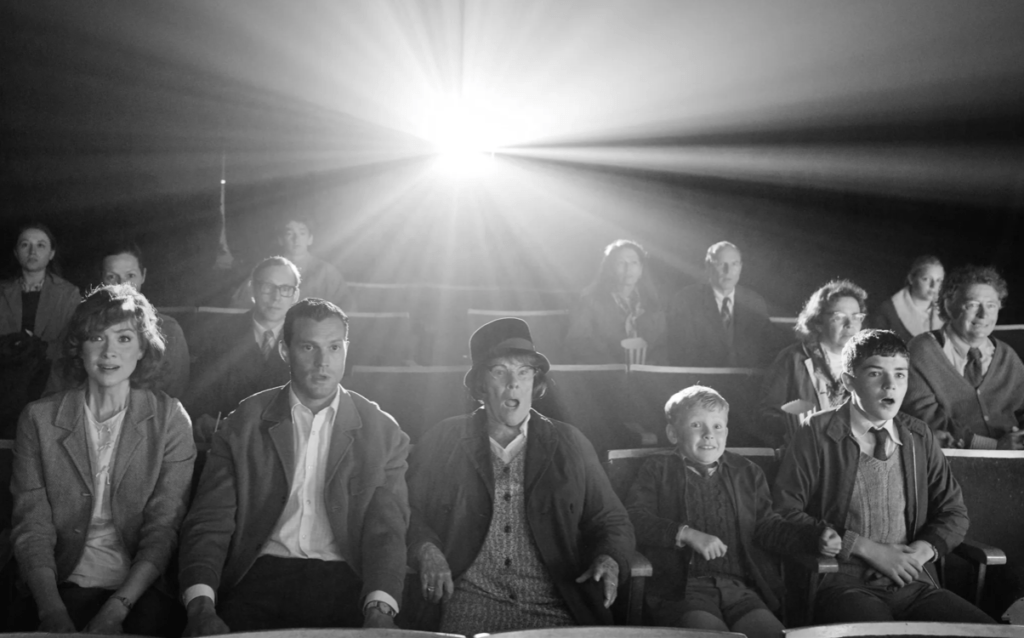In Branagh’s Beautiful ‘Belfast’, the Political is Deeply Personal
 Focus Features
Focus Features
Lisa Van Dusen
December 4, 2021
Belfast is a dateline that comes with baggage. The word itself long conjured bloody division, forbidding moral complexity, razor-wired streets and lives discounted for political advantage in the name of one more battle without a military solution.
The Belfast-born actor and director Kenneth Branagh clearly knows this, and so spends the first few minutes of his autobiographical film Belfast showing us the real city behind the clichés; providing a drone’s-eye, present-day, full-colour tour of the beating-heart port, the row houses and alleyways; the crenellated turrets of Belfast Castle. Absent from this montage are the shots of memorial murals and paramilitary graffiti of Protestant Shankill Road and Catholic Falls Road; the images that defined worldwide perceptions of the city over the three decades and 3,500 fatalities of The Troubles.
That’s because the story in Belfast-the-movie begins right on the cusp of that war, in 1969, in black and white, in the very hour of a young boy’s life when the working-class city block that defines his universe is terrifyingly transformed into a war zone. The audience first needs to process a Belfast at peace for that contrast to register as powerfully with us as it does on the face and in the mad scramble of eight-year-old Buddy, played by Jude Hill as the young Branagh — a Protestant kid in a mixed neighbourhood suddenly overrun by a Molotov cocktail-throwing, window-smashing mob on an anti-Catholic rampage.
This is when we realize — that moment when a wooden sword and trashcan-lid shield-wielding eight-year-old boy’s skedaddle home in response to the neighbourhood grapevine news that’s he’s wanted for tea is interrupted by sheer terror — that any movie that makes you cry in the first five minutes will not be skimping on sentimentality.
The result is a love letter not just to the real Belfast, not just to Branagh’s parents and grandparents, their neighbours and friends, but to human beings everywhere and in every era whose lives have been suddenly upended by the deadliest combinations of politics and hate.
It’s a credit to Branagh, who’s been a filmmaker long enough for it to have been a conscious, calculated risk, that he clearly chose to err on the side of sentiment throughout — not manipulative, treacly sentiment, but serious respect paid to the range of emotions experienced by people whose daily decisions large and small have suddenly been recalibrated by conflict. The result is a love letter not just to the real Belfast, not just to his own parents and grandparents, their neighbours and friends, but to human beings everywhere and in every era whose lives have been suddenly upended by the deadliest combinations of politics and hate.
That love is expressed in Branagh’s extraction of performances so exquisitely pure from Hill, from Outlander’s Caitriona Balfe as his mother, Jamie Dornan as his father, the priceless Judi Dench as his grandmother and Ciarán Hinds as his grandfather. It transmutes what, in the first, stunning moments looks like a director’s movie, into a beautifully generous actor’s movie, into a broader paean to the small miracles, unexpected tests, imponderable sacrifices and transcendent joys of ordinary lives — overthrown by extraordinary events or not. It also infuses his gratitude for the early escapism of his future vocation, from the High Noon echoes in his father’s defiance of the local hard men to the family’s collective wonder in a darkened theatre at the flying car in Chitty Chitty Bang Bang.
 Focus Features
Focus Features
Some reviewers have remarked that Branagh steers clear of the core conflict at the heart of events depicted in Belfast. He does not. He tells the story from the point of view of a child, which is no less legitimate or authentic than the version told in the headlines. Buddy’s neighbourhood suddenly goes from cocoon to battlefield. His parents begin arguing not just about money but about whether to stay or go — because of the conflict, but also because of the neighbourhood corruption newly cloaked in politics. His crush on a girl in his class becomes his crush on a Catholic girl in his class. Branagh not only incorporates the conflict at the heart of the events, he takes a side — that of reason; that the divisions were more about power than religion, that the distinctions were false and often ridiculous and that the love of the people who surrounded his eight-year-old self looms much larger than fear in the rear-view mirror.
That makes Belfast not just a tribute to human resilience, but to the spirit of a place now synonymous with the possibilities of peace.
Lisa Van Dusen is associate editor of Policy Magazine. She was Washington columnist for the Ottawa Citizen and Sun Media, international writer for Peter Jennings at ABC News, and an editor at AP National in New York and UPI in Washington. She has written about and edited coverage of the Northern Ireland peace process in all of those roles.
